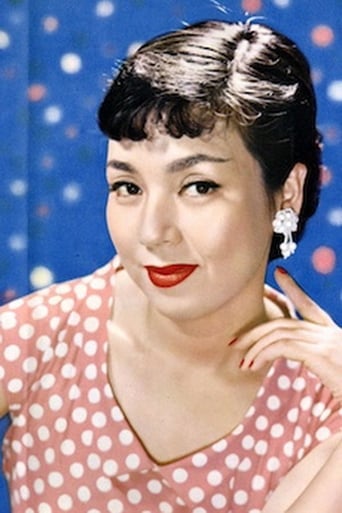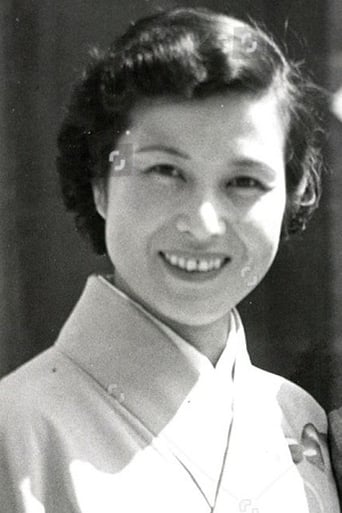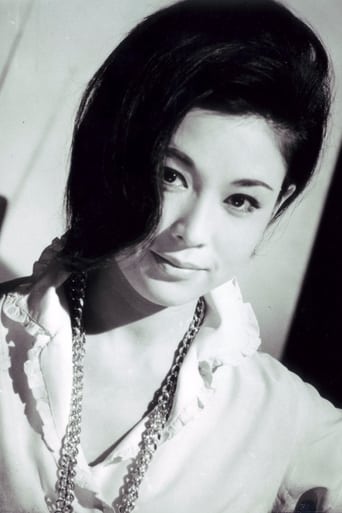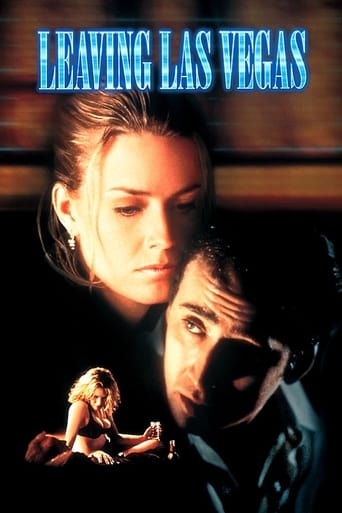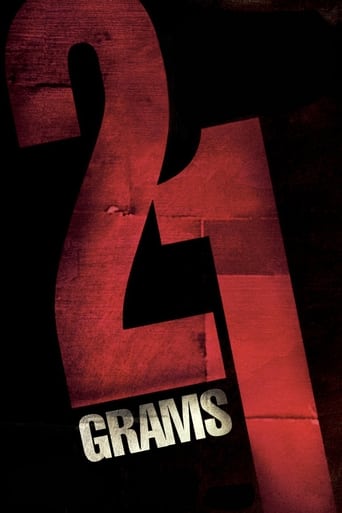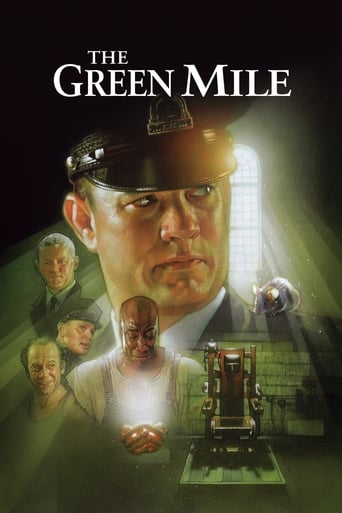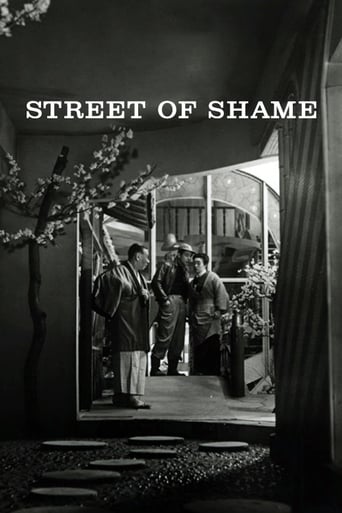
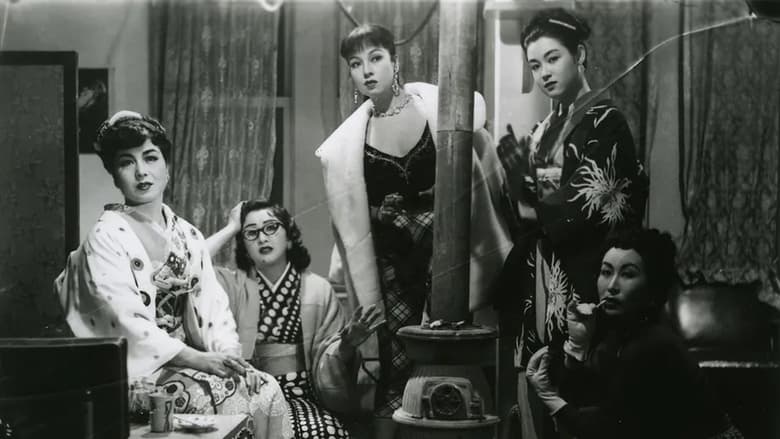
Street of Shame (1956)
The lives of five prostitutes employed at a Japanese brothel while the nation is debating the passage of an anti-prostitution law.
Watch Trailer
Cast


Similar titles
Reviews
Very very predictable, including the post credit scene !!!
Plot so thin, it passes unnoticed.
an ambitious but ultimately ineffective debut endeavor.
Each character in this movie — down to the smallest one — is an individual rather than a type, prone to spontaneous changes of mood and sometimes amusing outbursts of pettiness or ill humor.
This is the first film I have seen from Kenji Mizoguchi (1898-1956), a director who is considered with Ozu and Kurosawa as the best Japanese film directors ever (I love Ozu; I like some Kurosawa but think he is somewhat overrated).This was Mizoguchi's last film: he is known mostly from his historical epics, but the theme here is somewhat topical, even taken from the newspapers of the day: the lives of prostitutes working on a brothel in Tokyo's red light district in light of a law being discussed in the Japanese parliament for the criminalization of prostitution (that particular law would come into force in 1958).Mizoguchi shows us the harsh life of the prostitutes, without turning them into saints, as we saw them doing less than exemplary things, for example cheating on their clients. There is the new arrogant girl, Mickey (Machiko Kyo), another prostitute with a grown son who is ashamed of his mother but visits her to her embarrassment; another one has to care for a sick husband.If the movie has a position in the issue is that prostitution should be legal. Prostitution is deeply rooted in Japanese culture, it is implied in the movie, and this law is being put forward only due to the pressures from Americans. The owner and the Madame of the brothel are hard-nosed but take reasonable care of the prostitutes. In this sense, the film sometimes seems a "message movie", even didactic in its position. Myself, I don't have a position on whether prostitution should be legal or not, but it would be interesting if Mizoguchi let at least one of the characters defend the other side of the issue.The film has an odd musical score (especially for a movie from the 1950s), which is a sort of Theremin -based experimental score. I can't say it helps the movie. Despite the misgivings I have mentioned, I did like the film, and found it interesting and engaging.
Akasen chitai/Street of Shame (1956) is a brilliant motion picture. Some might find the subject matter depressing and this could be why this film is largely neglected but this film is a master-class in screen-writing, direction and ensemble acting.The story is deceptively simple. It tells the story of a group of prostitutes working in a red light district of Tokyo. Each prostitute character has a moment where they become the heart of the story. The superb ensemble cast includes Machiko Kyō as a streetwise hooker called Mickey. Machiko Kyō is a revelation in the part as she is so different from the characters she may be most famous for. The direction by Mizoguchi is simply excellent. This is Kenji Mizoguchi's last film and the world he recreates in Akasen chitai/Street of Shame could only have come from some experience in those red light dream factories.For 1956 this film is ahead of it's time and it is a far more honest and gritty study of prostitution than anything produced by film studios in the West at this time.
Watching this movie almost makes me feel like delivering an apology to Mizoguchi. Thanks to the wonderful Masters of Cinema releases of his movies I've been slowly working my way through his late period movies. I love them, but I felt that the failure of so many was an excessive formality - a feeling that his characters were not real people, more symbols of various levels of society. This movie is totally different, it is packed with wonderfully realized, vivid characterizations. Ironically, its his last film, but rather than being a swansong it was absolutely cutting edge - the film has a thoroughly modern feel to it, even down to its weirdly avant garde music (the one thing about it I have to say grated with me). And I understand it was one of his biggest commercial hits, a huge success in its day.The story follows a group of prostitutes in 'Dreamland' a typical brothel of its day in the nighttime quarter of Toyko, shortly before they were made illegal. At the time, brothels were seen as mildly disreputable, but still legitimate businesses. The women work 'voluntarily', but most are trapped due to debts and poverty. They range from the tough, selfish and westernized 'Mickey', a wonderful Machiko Kyo (unrecognizable from the ghost in Ugetsu), the very beautiful Ayako Wakao as the angelic looking but thoroughly ruthless Yasumi, Aiko Mimasu as the aging Yumeko, and a variety of other characters, all without exception wonderful and believable performances.While humanizing all his characters, Mizuguchi doesn't pull punches about the desperate poverty of the time and the dire straits the women are in. The brothel owner repeatedly insists he is like a social worker, looking after poor women - and he is so convincing he believes it himself. The script never falls into the trap of didactic sermonizing, it simply lets the stories speak for themselves. Maybe Mizoguchi, who was no stranger to brothels in his private life had deeply ambiguous feelings for them himself.Its interesting to compare this movie to another similar one of this period (and a personal favourite of mine) - Mikio Naruse's 'Flowing', which is much less direct and harsh, with more of an air of sadness at how a part of Japanese society was fading away - but then again, that film was set in a more genteel upmarket geisha house.This is an immensely fine movie - structurally its amazing that such a complex story with so many characters could be so convincingly told in a relatively short run time - a lesson to all modern film makers. Its absolutely riveting and a masterclass in film making and acting.But as a final point, films like this are often difficult to end - there is no clear way of finishing a story without a clear narrative arc and how many times have we all seen great movies that let us down with a contrived or poorly thought through ending? I won't give it away, but the ending of 'Akasen Chitai' is quite unexpected and absolutely devastating. Its starkness should by rights leave it up there with the famous last scene in '400 Blows' as one of the greatest in cinema history.
I do not need every movie to have a pleasant ending or have characters I admire, though not having these certainly makes it more difficult for me to enjoy a movie. There are of course exceptions (such as The Seventh Seal or Adele H.--both very depressing movies with very difficult to relate to characters), but it certainly is an uphill battle."Streets of Shame" is about the post-WW2 movement to eliminate prostitution in Japan as seen from the perspective of women working in one whorehouse. As I eluded to above, it was hard to really care about most of the characters--many were quite selfish and had unattractive personalities. This isn't always the case in the movie (such as the young man who is angry at and resents his mother for prostituting herself to ensure a decent life for him), but generally I didn't find the individuals that compelling.It is true that prostitution has a very different stigma in Japan than in many Western countries and so I found this fascinating. However, to get a more compelling treatment of prostitution, try watching Kenji Mizoguchi's film, "A Geisha"--in which an UNWILLING woman is forced to a life of prostitution and desperation.


